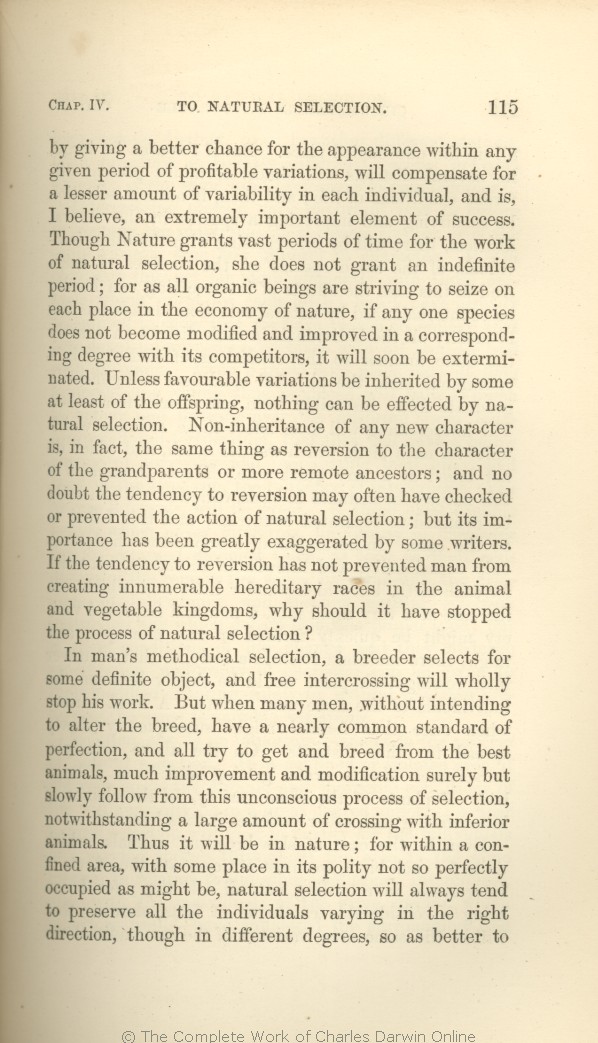by giving a better chance
for the appearance within any given period of profitable variations, | for the appearance within any given period of profitable variations, 1859 1860 1861 1866 |
| for the appearance of profitable variations within any given period, 1869 |
| within any given period for the appearance of profitable variations, 1872 |
| an extremely 1859 1860 1861 1866 1869 | | a highly 1872 |
| Nature 1861 1866 1869 1872 | | nature 1859 1860 |
| vast 1859 1860 1861 1866 | | long 1869 1872 |
| striving 1861 1866 1869 1872 | | striving, 1859 1860 |
| OMIT 1861 1866 1869 1872 |
| it may be said, 1859 1860 |
| soon 1859 1860 1861 1866 | soon 1869 1872 |
| selection. 1861 1866 1869 |
| selection. The tendency to reversion may often check or prevent the work; but as this tendency has not prevented man from forming by selection numerous domestic races, why should it prevail against natural selection? 1872 |
| has 1861 1866 |
| may often check or prevent the work; but as this tendency has 1869 |
| creating innumerable hereditary races in the animal and vegetable kingdoms, 1861 1866 |
| forming by selection numerous domestic races, 1869 |
| have stopped the process of 1861 1866 |
| prevail against 1869 |
|
|
In
man's | man's 1859 1860 1861 1866 |
| the case of 1869 1872 |
| free intercrossing will wholly stop 1859 1860 1861 1866 1869 |
| if the individuals be allowed freely to intercross, 1872 |
| work. 1859 1860 1861 1866 1869 |
| work will completely fail. 1872 |
| get 1859 1860 1861 1866 | | procure 1869 1872 |
| much 1859 1860 1861 1866 1869 | much 1872 |
| and modification 1859 1860 1861 1866 | and modification 1869 1872 |
| follow 1859 1860 1861 1866 | | follows 1869 1872 |
| a large amount of crossing with inferior animals. 1859 1860 1861 1866 1869 |
| that there is no separation of selected individuals. 1872 |
| in 1859 1860 1861 1866 1869 | | under 1872 |
| its 1859 1860 1861 1866 1869 | | the natural 1872 |
| so 1859 1860 1861 1866 | so 1869 1872 |
| occupied 1859 1860 1861 1866 | | occupied, 1869 1872 |
| as might be, natural selection will always tend to preserve 1859 1860 1861 1866 |
| natural selection will always tend to preserve 1869 |
| OMIT 1872 |
| so as better to fill up the unoccupied place. 1859 1860 1861 1866 1869 |
| will tend to be preserved. 1872 |
|









